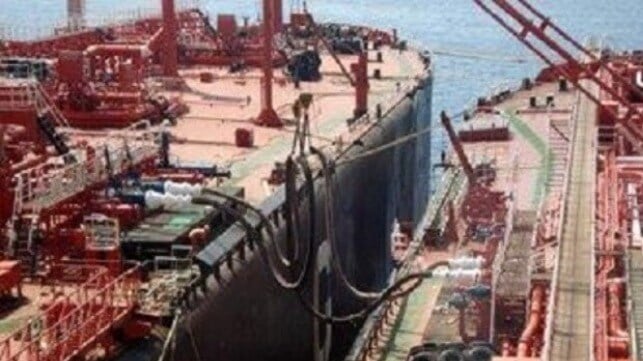EU Passes New Sanctions on Russian STS Oil Transfers

After an extended debate, the European Union has agreed to an 11th package of sanctions on trade with Russia, and it includes noteworthy provisions for shipping. As expected, the EU will impose a port ban on tankers that engage in STS transfers of Russian oil at sea, expanding a recently-adopted Spanish law enforcement policy across Europe.
Ship-to-ship transfers have become a go-to method for Russian oil exporters and their customers. These transfers allow the smaller Suezmax tankers that serve Baltic ports to transload their cargoes to VLCCs; similar transfers are used in the Western Pacific for cargoes from the Russian oil port of Kozmino. STS transfers are often used to obscure the origins of Russian oil, camouflage its sanctions compliance status, and keep the trade hidden from regulators and watchdogs.
The waters of the Mediterranean off Ceuta and Kalamata have become busy hubs for these operations, and European officials have noticed. Spain has already taken action against two tankers that engaged in STS transfers with a sanctioned Russian vessel, denying port access to one suspect ship and detaining another.

that matters most
Get the latest maritime news delivered to your inbox daily.
Last month, the European Commission proposed that vessels linked to oil transload operations that violate the G7 price cap on Russian crude should be banned from EU ports. The exact details of the final measure adopted Wednesday have not yet been released, and will remain under wraps until publication in an official gazette. The specifics will have significant implications for vessel operators and service providers who choose to transact in Russian energy exports. Early media reports suggest that the scope of the new EU regulation covers STS transfers "at sea," leaving unclear whether the EU will attempt to ban STS activity that occurs in waters where it does not generally have jurisdiction (high seas).
According to Ukrainian outlet European Pravda, the 11th sanctions package passed after an unannounced side agreement with the government of Ukraine. Greece and Hungary both objected to the inclusion of companies from their respective nations on the Ukrainian register of "international sponsors of war," an informal list of firms suspected of enabling Russian revenue generation during wartime. Greece has protested Ukraine's listing of five Athens-based tanker companies with Russian business portfolios, including TMS, Dynacom, Minerva Marine, Thenamaris and Delta Tankers. As part of the deal to secure the 11th sanctions package, Ukraine has now suspended these firms's listings "for the period of bilateral consultations involving representatives of the European Commission." Several other prominent maritime and offshore companies remain on the list, including some with American administrative headquarters.
